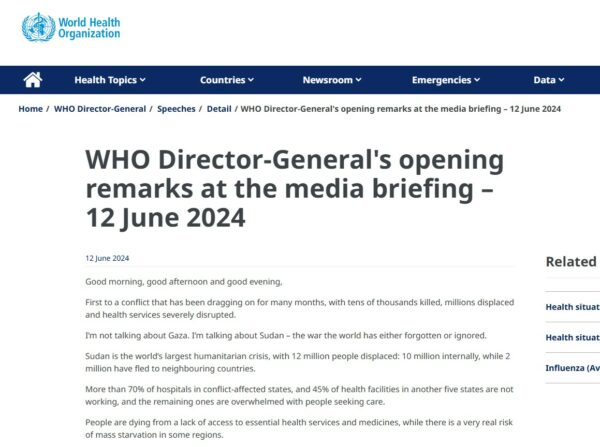GENEVA, Wednesday, June 12, 2024 (WAFA)– The World Health Organization (WHO) has documented 32 deaths attributed to malnutrition in Gaza, including 28 among children under 5 years old, WHO Director-General Tedros Adhanom Ghebreyesus said today.
Speaking at the opening remarks of a media briefing, Ghebreyesus said: “There have already been 32 deaths attributed to malnutrition, including 28 among children under 5 years old.”
“A significant proportion of Gaza’s population is now facing catastrophic hunger and famine-like conditions,” he elaborated. “Despite reports of increased delivery of food, there is currently no evidence that those who need it most are receiving sufficient quantity and quality of food.”
He added that the WHO and its partners have scaled up nutrition services.
Commenting on the need for an immediate ceasefire in the war-torn Gaza Strip, Ghebreyesus noted that the WHO welcomed the UN Security Council resolution adopted on Monday, which calls for a full and immediate ceasefire.
“We urge all parties to take steps to implement the resolution immediately and bring a permanent end to the suffering of millions of people,” he said.
“We urge all parties to take steps to implement the resolution immediately and bring a permanent end to the suffering of millions of people,” he affirmed.
Highlighting the escalating health crisis in the occupied West Bank, he stated that the “WHO has documented 480 attacks on health care in the West Bank since the 7th of October last year, resulting in 16 deaths and 95 injuries.”
“While the world’s focus has been on Gaza, there is also an escalating health crisis in the West Bank, where attacks on health care and restrictions on movement of people are obstructing access to health services.”
“Since the war in Gaza started, 508 Palestinians have been killed in the West Bank, including East Jerusalem, including 124 children. More than 5,000 have been injured, including about 800 children.”
“In most areas of the West Bank, clinics are only operating two days a week, and hospitals are operating at about 70% capacity,” he added.
He identified colonial settlement construction and expansion as a key reason for restricting Palestinians’ access to healthcare.
“Illegal settlements have expanded in the occupied West Bank, impacting the population’s access to health services,” he said.
He concluded by underscoring that “the best medicine is peace” and urged “all sides to implement the Security Council resolution immediately.”

